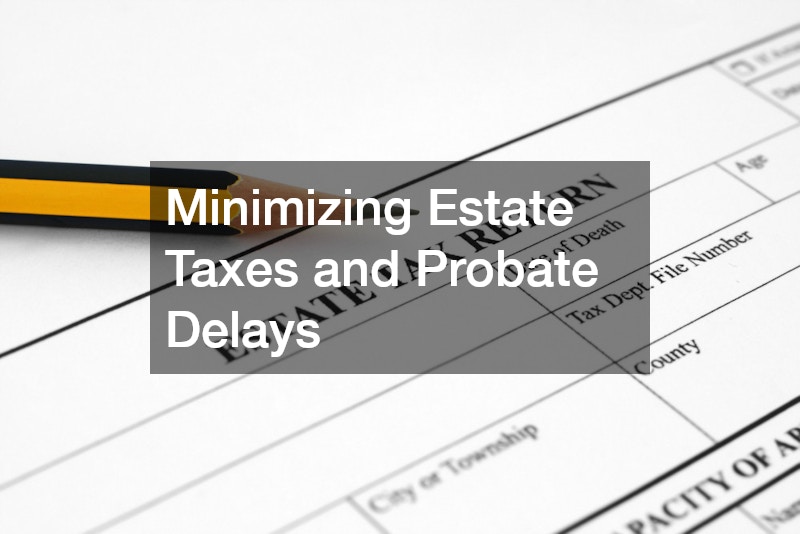Creating an effective estate plan is one of the most important steps an individual can take to protect their legacy, ensure their wishes are carried out, and reduce stress for their loved ones. A well-thought-out plan can address everything from asset distribution and guardianship of minors to medical directives and financial responsibilities in the event of incapacity or death. Without a clear plan in place, your family may face lengthy probate processes, unexpected tax burdens, and disputes that could have been avoided.
An estate plan is not just for the wealthy or elderly—it’s a valuable tool for anyone who wants control over what happens to their assets, their dependents, and their healthcare decisions. It provides peace of mind and clarity during times of uncertainty. Whether you’re starting from scratch or looking to revise an existing plan, understanding the components of a comprehensive estate plan will empower you to make confident, informed decisions that reflect your values and priorities.
Understanding the Basics of Estate Planning

At its core, estate planning is about preparing for the inevitable in a way that honors your wishes and protects your loved ones. This involves setting up legal documents that determine how your assets will be distributed, who will care for your dependents, and how decisions will be made if you are unable to make them yourself. Many people put off creating an estate plan, thinking it’s too early or too complicated. However, beginning the process early ensures that you have full control over your legacy and can adapt your plan as your life circumstances change.
When diving into the planning process, consulting a qualified estate attorney can be a critical first step. These professionals specialize in creating legally sound documents and ensuring your estate plan complies with current laws. They can guide you through wills, trusts, power of attorney, and other essential components, helping to avoid mistakes that could lead to legal complications later. Having a trusted advisor also brings peace of mind, knowing your wishes are being translated into clear, enforceable directives.
Choosing the Right Type of Will
A will is one of the foundational documents in any estate plan, serving as a written record of how you want your property distributed after your death. It can also name guardians for minor children, assign an executor to manage your estate, and express final wishes. Without a valid will, your assets may be distributed according to state laws, which may not align with your personal intentions. Creating a will ensures that your voice is heard, even after you are gone.
To navigate the nuances of drafting a will, it’s wise to work with an experienced estate planning lawyer. They can help tailor your will to your specific situation—whether it involves blended families, unique assets, or charitable donations—ensuring your estate plan reflects your true intentions. A legal expert can also assist in choosing between different types of wills, such as simple wills, testamentary trusts, or pour-over wills, depending on the complexity of your estate.
Exploring the Benefits of Living Trusts
While wills are essential to an estate plan, they often require the probate process, which can be time-consuming and public. A living trust offers a valuable alternative or supplement to a will, allowing your assets to pass directly to your beneficiaries without probate. This not only saves time and legal expenses but also provides greater privacy and flexibility in managing your estate. A living trust can also help manage your affairs during your lifetime if you become incapacitated.
For more complex estates or situations where you want to minimize disputes, a trust litigation attorney can be a key asset. These professionals specialize in resolving conflicts that arise from trusts and can also help structure your trust to reduce the likelihood of litigation in the first place. Incorporating a trust into your estate plan with the help of a legal expert ensures that it’s properly funded, clearly written, and aligned with your broader goals, making the transition smoother for your loved ones.
Naming a Reliable Executor or Trustee

Choosing the right person to carry out your wishes is a critical part of building a strong estate plan. An executor (named in a will) or trustee (named in a trust) manages your estate, pays debts, distributes assets, and sometimes makes sensitive decisions on your behalf. This role requires not only trustworthiness and attention to detail but also a degree of financial literacy and emotional resilience.
Because this role often involves complex financial decisions, many people benefit from consulting a financial planner when choosing or preparing an executor or trustee. A planner can help evaluate whether a potential appointee is financially competent and may even serve as a co-trustee in more intricate estates. Including a knowledgeable professional in your estate plan helps reduce the burden on family members and ensures that your financial matters are handled with care and expertise.
Designating Guardians for Minor Children
For parents, one of the most emotionally challenging yet crucial elements of an estate plan is naming a legal guardian for their minor children. This decision involves much more than just choosing a trusted individual—it’s about identifying someone whose values, parenting style, and long-term stability align with your vision for your child’s upbringing. The thought of someone else raising your children can be deeply unsettling, which is why many parents delay making this choice. However, having this designation in place brings peace of mind, knowing that in the event of a tragedy, your children would be cared for by someone you have thoughtfully and intentionally chosen.
Without a legally documented guardian, the responsibility of choosing who will raise your children falls to the court system. Judges will make their decision based on the best interests of the child, but their interpretation may not reflect your personal preferences, religious beliefs, or family dynamics. This process can also create conflict among relatives or loved ones who may have differing opinions about what is best. Including a guardianship designation in your estate plan ensures that your wishes are known and followed, minimizing confusion and potential legal battles, while providing a clear path forward for your children’s care and emotional stability.
When selecting a guardian, it’s helpful to consider not only the person’s relationship with your child but also their ability to provide stable care. Talking to professionals in childcare services can provide insights into what resources and support systems a guardian might need. Including a well-considered guardianship clause in your estate plan gives you peace of mind, knowing that your children’s future will be protected and thoughtfully planned.
Planning for Incapacity With Power of Attorney
An essential, though often overlooked, part of an estate plan is preparing for the possibility of becoming incapacitated. Accidents, illness, or cognitive decline can leave you unable to manage your finances or make medical decisions. Assigning power of attorney allows a trusted individual to step in and make these decisions on your behalf, ensuring continuity and avoiding court-appointed guardianship, which may not reflect your preferences.
For those facing chronic conditions or navigating complex health issues, consulting disability attorneys can add an important layer of expertise to your planning. These professionals understand how to structure power of attorney documents in a way that aligns with disability rights and long-term care planning. Including their guidance in your estate plan helps ensure that your future care and financial matters are managed respectfully, responsibly, and in line with your wishes.
Minimizing Estate Taxes and Probate Delays

One key goal of an effective estate plan is to preserve as much of your estate as possible for your beneficiaries. Without thoughtful planning, estate taxes, court fees, and administrative delays can quickly reduce the value of what you leave behind. Strategies like gifting during your lifetime, setting up trusts, and designating beneficiaries on retirement accounts can all help minimize tax burdens and streamline asset distribution.
Working with a professional who specializes in tax resolution can help you identify tax-saving opportunities tailored to your unique situation. They can assist in structuring your estate plan to reduce liability while staying compliant with ever-changing tax laws. By proactively addressing potential tax pitfalls, you ensure a more efficient and beneficial transfer of wealth to your loved ones.
Including Health Care Directives and Living Wills
Health care directives and living wills are critical parts of any comprehensive estate plan. These documents allow you to state your preferences for medical treatment in the event that you’re unable to speak for yourself. Whether it’s the decision to pursue life-sustaining treatments or to decline certain interventions, clearly documenting your wishes relieves loved ones of difficult decisions and ensures that your healthcare choices are honored.
Including insights from a home health care service provider can be especially helpful when drafting these documents, particularly if you anticipate needing in-home medical support. These professionals understand the practical aspects of care and can help inform your choices around treatment options, daily living assistance, and end-of-life care. Incorporating these considerations into your estate plan supports both your comfort and autonomy, even during serious health events.
Updating Your Estate Plan Over Time
An estate plan is not something you create once and forget about—it’s a living set of documents that should evolve alongside your life. As your circumstances change, so too should your plan. Major milestones such as getting married, going through a divorce, having children, experiencing the death of a loved one, or receiving an inheritance can all have a significant impact on your goals and obligations. Even changes in your financial situation, like purchasing a home, starting a business, or retiring, may require updates to ensure your plan remains aligned with your current needs and values.
In addition to personal changes, laws surrounding estates, taxes, and healthcare directives can shift over time, potentially affecting the validity or efficiency of your existing documents. Regularly reviewing your estate plan—ideally every few years or after any major life event—helps keep your wishes clearly stated and legally enforceable. It also allows you to revisit key decisions, such as who you’ve appointed as executor, trustee, guardian, or power of attorney, to confirm they are still the right fit.
Another important reason to revisit your estate plan is to account for often-overlooked expenses like funeral costs, which can place a sudden burden on loved ones if not planned for in advance. By allocating funds or outlining your final wishes clearly, you help reduce stress and uncertainty for your family during an already difficult time. A thorough and current estate plan is one of the most compassionate gifts you can leave behind.
Seeking Professional Legal Guidance

Navigating the legal landscape of estate planning can be complex, especially when your situation involves multiple assets, dependents, or state-specific laws. While there are DIY options available, working with professionals can help you avoid common mistakes and oversights that could create confusion or legal challenges down the line. A strong estate plan often reflects the collaborative effort of legal, financial, and healthcare experts who understand the bigger picture.
Beyond just drafting documents, professionals can help plan for the more personal aspects of legacy, including end-of-life preferences, memorial services, and even decisions as detailed as selecting a gravestone. Including such choices in your estate plan can give your loved ones clarity and comfort during a difficult time, allowing them to focus on honoring your life rather than guessing at your wishes.
An effective estate plan is more than just a stack of legal documents—it’s a thoughtful, proactive approach to protecting your loved ones, your assets, and your personal wishes. It offers clarity in times of uncertainty and helps avoid unnecessary conflicts, expenses, and delays. Whether your estate is simple or complex, taking the time to plan now ensures your voice is heard later when it matters most. From selecting guardians to minimizing taxes, each element of your estate plan plays a crucial role in shaping your legacy.
Above all, estate planning is about peace of mind—for you and for those you care about. It’s a deeply personal process, but one that doesn’t have to be overwhelming. With the right guidance and regular updates, your estate plan can grow and adapt with you, providing a lasting foundation of security and intention. Start today, knowing that the decisions you make now can bring comfort, protection, and clarity to those you leave behind.
